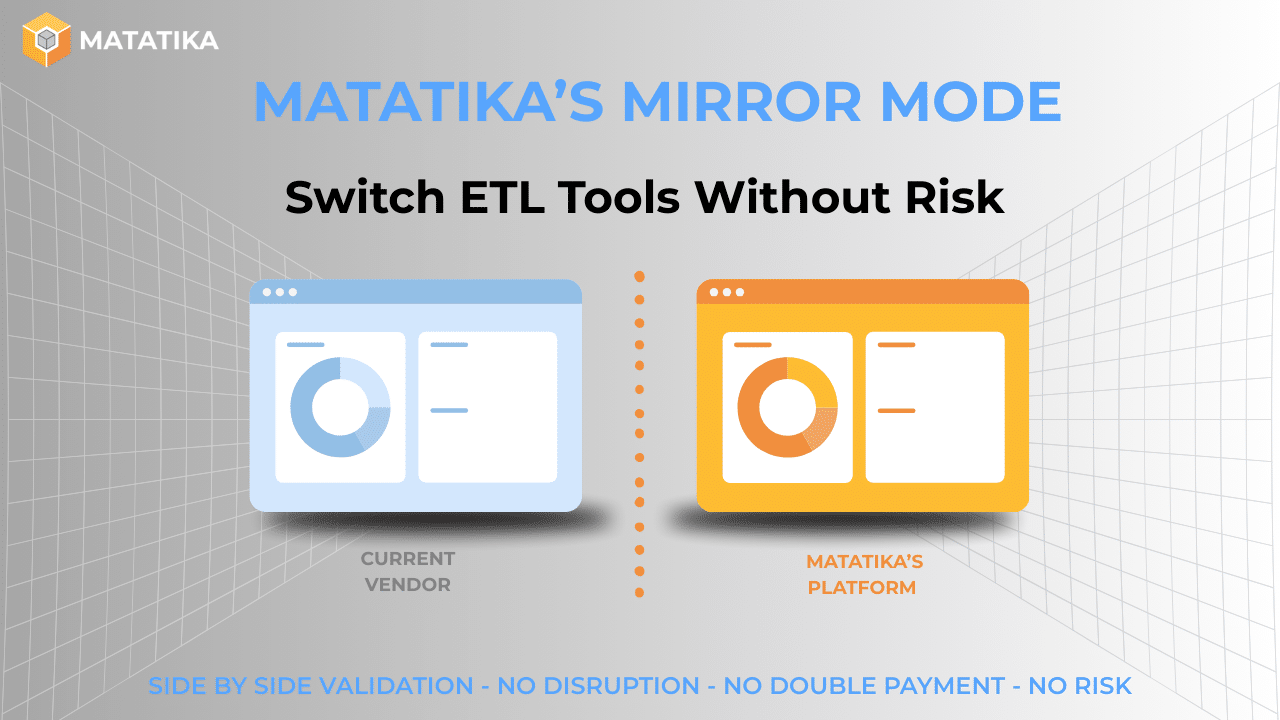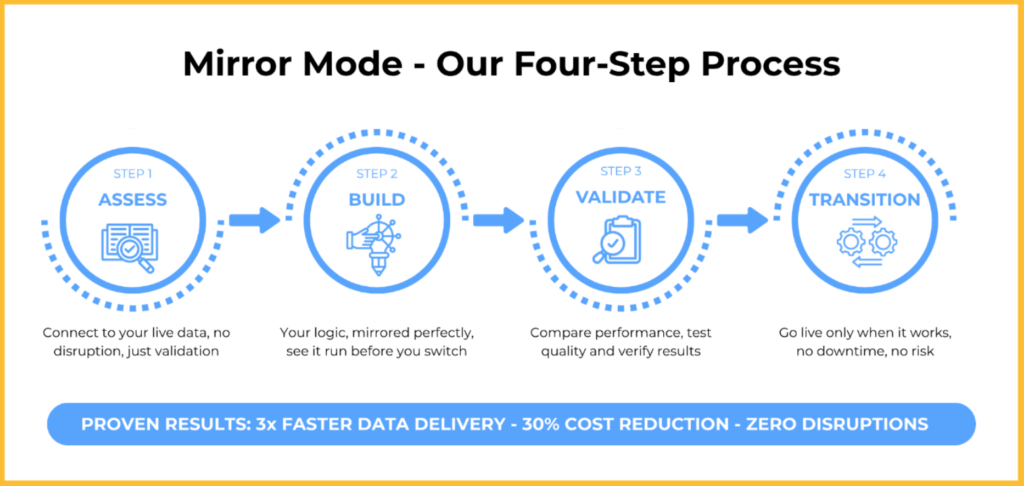Trapped by Your ETL Tool? How Mirror Mode Helps You Switch ETL Tools Without Risk
Is it time to switch ETL tools, but you’re unsure how to avoid the risk? You’re likely overpaying, chasing down sync failures, and struggling with slow support. And if you’re stuck on a row-based pricing model, your growth is being penalised, not rewarded.
Yet despite the frustration, migration feels dangerous. You might ask:
“What if the switch breaks dashboards our execs rely on?”
“Can we justify paying for two tools during a long transition?”
“What if the migration fails, and we’re worse off than before?”
At Matatika, we’ve seen these concerns repeatedly. So we designed a solution that removes the danger entirely.
It’s called Mirror Mode—a risk-free way to switch ETL tools with no disruption, no downtime, and no double payment.
The Problem: You’re Not Just Paying Too Much – You’re Paying to Stay Stuck
Most legacy ETL tools rely on row-based pricing, a model that charges you for every row of data processed, regardless of whether it’s useful, duplicated, or even stored.
Imagine this:
- You sync 10 million rows daily
- Only 5% of that data has changed your reporting
- Yet, you’re charged based on the full data volume, every month
It’s not just inefficient.
It’s a pricing model that punishes growth, instead of rewarding efficiency.
That leads to:
- Costs that scale faster than value
- No incentive to reduce waste
- No transparency for finance or tech leaders
- And contracts designed to lock you into your current ETL vendor
What Smart Data Teams Do Differently
At Matatika, we believe in a different approach to the modern data stack.
They Validate Before They Commit
→ You should pay for what you actually use
→ Pricing should align with business value, not raw volume
→ Your stack should grow with you, not against you
Our performance-based pricing model reflects real infrastructure usage, not abstract units like active rows.
It’s transparent. Predictable. And designed to eliminate waste, not monetise it.
But even when leaders see the value, switching ETL tools still feels risky.
That’s where Mirror Mode comes in.
They Eliminate Double Payment Risk
Smart teams don’t rip and replace their ETL tooling. They use Matatika’s Mirror Mode to run both systems in parallel, validating performance and output before making any changes to production.
Unlike traditional migrations that often require paying for both systems during transition periods, Mirror Mode is free until go-live. This removes the financial barrier to testing new platforms.
They Focus on Performance-Based Pricing
They recognise that row-based pricing punishes growth and seek alternatives that align with actual infrastructure usage, paying for value received, not raw data volume.
Mirror Mode: The Risk-Free Path to ETL Migration
Matatika’s Mirror Mode is your risk-free way to switch ETL providers. It lets you run our platform alongside your current vendor, with no disruption, no double payment, and no risk.
Here’s how it works:
- ASSESS — We connect to the same data sources you’re already using
→ No schema changes, no rebuilds. Your existing structure stays as it is. - BUILD — We replicate your core transformations inside Matatika
→ See how we perform side by side using your real logic and workloads. - VALIDATE — We compare the output in real time
→ Verify both ETL systems live without disrupting your current setup. - TRANSITION — You only switch when you’re confident
→ No deadlines. No downtime. No broken reports. No pressure.
You only pay when you cut over
→ Mirror Mode is free until go-live. No “double bubble” payments.
Why This Works for Data Teams & Finance Teams Alike
For data teams, this means:
- Zero disruption to continue delivering business value
- Full validation of Matatika’s ETL transformations and syncs
- A clear low-risk path out of vendor lock-in contracts
For finance teams, this means:
- No overlapping vendor payments during transition
- Clear ROI before committing
- A strategic, validated data pipeline migration, not a shot in the dark
In their words:
“We need to cut costs, but leadership won’t approve a risky move.”
Mirror Mode removes the risk.“Switching platforms should feel like an upgrade, not a gamble.”
Mirror Mode makes it feel like flipping a switch.
Supporting Insight: What Happens When You Flip the Switch?
Once you’ve validated the setup and you’re confident Matatika performs, switching is seamless.
We manage the cutover, ensure continuity, and decommission your old pipelines safely.
You go from overpaying for an inflexible ETL platform
To a cost-aligned, performance-based ETL tool that is fully supported and future ready.
In a recent analysis of 50+ enterprise data teams, we found that organisations typically overpay for ETL by 40-60% due to inefficient row-based pricing models.
One digital media platform that migrated from a traditional ETL provider to Matatika using our systematic four-step process achieved:
- 3x faster data delivery — reducing refresh times from 45-60 minutes to just 15 minutes
- 30% reduction in total ETL costs by moving to a more efficient solution
- Zero disruption to production systems during the transition
- Significant operational improvements including robust data quality testing and monitoring
“Without a doubt, this has been my favourite ETL migration. The support from the Matatika team is brilliant.”
Duncan Williams, CTO Resident Advisor
The Matatika Difference: Why We Built Mirror Mode
The name Matatika comes from the Māori word for ethical or principled. We didn’t choose this name by accident.
In an industry where vendor lock-in is the norm and pricing opacity is a strategy, we saw data leaders being held captive by their own success. The more data you process, the more expensive and risky change becomes—creating a cycle that seems impossible to break.
That’s why Mirror Mode exists. We built it because we believe:
- In transparency when others prefer obscurity. Your ETL costs shouldn’t be a black box. You deserve to know exactly what you’re paying for and why—before you sign anything.
- In proving value before asking for commitment. Traditional vendors want you to leap first and look later. We let you see both sides of the bridge before you cross.
- In engineering for freedom, not dependency. We design our tools to earn your business every month—not to make leaving so painful you stay despite dissatisfaction.
- In human support from actual engineers. Not tickets that disappear into queues, not chatbots, not overseas call centres reading from scripts—real people who understand your specific data challenges.
Mirror Mode embodies these principles in practice. It’s not just a technical solution—it’s our commitment to a different kind of relationship with our customers.
While other vendors profit from your inability to leave, we’ve invested in making evaluation and transition completely risk-free. Because we believe your trust must be earned with evidence, not promised with contracts.
That’s the Matatika difference. Ethical data practice means offering freedom—not lock-in.
Don’t Renew Before You Review
Delaying your ETL switch means more months of:
- Overpaying on row-based pricing
- Wrestling with sync issues and slow support
- Missing the 40-60% cost savings Matatika delivers
Book your 45-minute ETL Switch-Ready Review
We’ll assess your setup, calculate your potential savings, and provide a risk-free migration roadmap—all before your renewal deadline.
You don’t have to guess. Mirror first.
Frequently Asked Questions
How can we switch ETL platforms without risking our production environment?
Mirror Mode creates a safety net by running both systems in parallel with zero production risk. You validate every transformation before committing, comparing output side-by-side with your actual workloads. Only when you’re 100% confident do you make the switch.
How does Matatika’s pricing model differ from traditional row-based pricing?
Our performance-based pricing reflects actual infrastructure usage, not arbitrary row counts. This typically delivers 40-60% savings compared to row-based models, with the most dramatic savings for data-intensive organisations. Before you sign anything, we provide a detailed comparison showing exactly what you’ll save with your specific workloads.
How long does a typical Mirror Mode implementation take?
Most teams complete the entire process in 2-4 weeks, including setup (2-3 days), replication (3-5 days), validation (1-2 weeks), and cutover preparation (2-3 days). For environments with fewer than 10 sources, we’ve completed the process in as little as 10 days. You control the timeline—we move as quickly or methodically as your situation requires.
What if our renewal deadline is approaching but we haven’t finished validation?
We offer a flexible “renewal bridge” that lets you continue validation even if your current vendor’s renewal date arrives. This can include help negotiating a shorter extension with your current provider or temporary measures to ensure business continuity while completing validation. You won’t be forced to choose between a rushed migration or another year of overpaying.
What’s different about Matatika’s support compared to other vendors?
From day one—before you’re even a paying customer—you’ll work with actual Matatika engineers who understand your specific use cases, not generic support staff. Our average initial response time is under 3 hours, with technical solutions typically delivered within the same business day.
#Blog #Data Pipeline Modernisation #ETL migration #Performance-Based Pricing #Switch ETL tools #Vendor Lock-In Solution
Data Leaders Digest
Stay up to date with the latest news and insights for data leaders.


